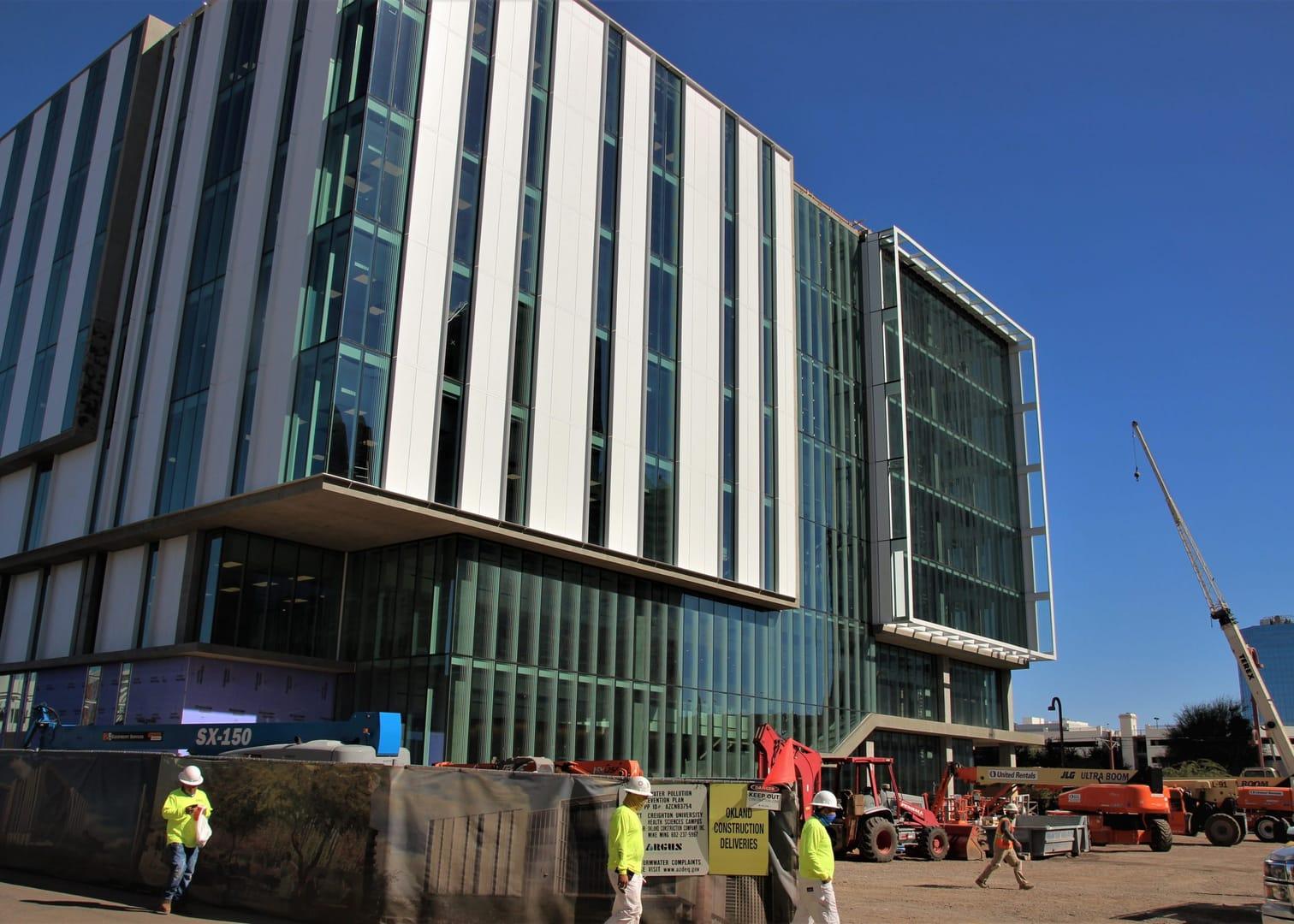PHOENIX — In recent years, if you tried to schedule an appointment with your doctor, you probably were told it would be several weeks before you could see someone.
The onset of the COVID-19 pandemic in early 2020 has only added to that delay.
Analysts in the medical community do not see immediate improvement for Arizona, even after the pandemic subsides. More people are coming to the state, including older individuals adding to an already expanding senior population.
That’s why Jesuit-run Creighton University’s new $100 million, 180,000-square-foot health sciences campus in Phoenix, scheduled to open for classes this fall, is welcome news not only to patients but to those who plan a career in medicine.
“The need for health care workers in the Southwest was already well-documented before the pandemic hit,” said Catherine Todero, vice provost of Health Sciences Campuses for Creighton and dean of the College of Nursing.
“Many professions are experiencing major retirement cycles, and the stress of COVID-19 may accelerate that phenomenon. Creighton’s new campus will provide much-needed capacity for health care education for the entire Southwest area,” Todero said.
She made the comments in an email to The Catholic Sun, newspaper of the Diocese of Phoenix.
Todero added: “Within the next few years, Creighton expects to enroll more than 900 students there, studying to be future physicians, nurses, occupational therapists, physical therapists, pharmacists, and physician assistants. Combined with the university’s Omaha campus, this would make Creighton one of the largest Catholic health professions educators in the United States.”
Creighton University also is about to break ground on a new health sciences complex in Omaha, Nebraska — the CL Werner Center for Health Sciences Education — which will be the new home of the Creighton School of Medicine.
With this complex and the Phoenix campus, Creighton will be the largest health professions educator in the nation by 2024.
The Greater Phoenix Economic Council estimates Creighton’s expansion in Arizona will create more than 250 jobs, $124.5 million in personal income, $12 million in tax revenue and more than $300 million in total economic output.
But the main impact will be on the medical community and higher education.
Occupancy will start in May and will phase in over the next two months until the building is fully occupied, according to Derek Scott, Creighton’s associate vice president of facilities management. The project was not affected by any delays due to the pandemic, he said.
Creighton is not new to the Phoenix area.
The university in Omaha began sending medical students to Dignity Health St. Joseph’s Hospital and Medical Center for clinical rotations. That relationship expanded in 2009 when Creighton and St. Joseph’s formally established a Creighton campus for third- and fourth-year students. The hospital is just west of the new campus building.
More medical education — and health care professionals — are desperately needed in Arizona.
According to the Arizona Primary Care Physician Workforce Report 2019 by the University of Arizona Center for Rural Health, Arizona ranks 31st of 50 states in total physicians with active licenses. There are 235.8 physicians per 100,000 residents.
The Grand Canyon State ranks 42nd for total active primary care physicians at 77.9 per 100,000 residents. Nationwide, the figure 91.7 per 100,000.
Besides population growth and an expanding elderly segment, the state has many rural areas without enough health care professionals.
Creighton is currently working to address health care needs of underserved populations in Maricopa County, which includes Phoenix and several other cities, through a collaboration with the Society of St. Vincent de Paul.
In March, that joint effort received $10 million from the Virginia G. Piper Charitable Trust to help reduce growing health disparities that especially affect low-income populations and people of color.
The University of Arizona report, citing figures from the U.S. Department of Health and Human Services and The Robert Graham Center — which does research for the American Academy of Family Physicians — says the state needs 558 primary care physicians now, and an additional 1,941 by 2030.
In addition, Gov. Doug Ducey signed legislation in 2019 making Arizona the first state in the country at the time to recognize occupational licenses for new residents.
“We know to meet our growing demand, Arizona needs to grow our supply of health care professionals. And that’s exactly what this new campus will help us do,” Ducey said during the 2019 groundbreaking ceremony.
Creighton is the state’s only Catholic-based school for higher learning in medicine.
“Creighton is known for producing health professionals committed to the Jesuit value of caring for the whole patient — mind, body and spirit. Our graduates then go on to careers in which service for and with others is central to their practices,” noted Todero.
“We’re training to care about people. It’s not a job, it’s a vocation, and we really believe it’s a ministry — the ministry of Jesus Christ to care for others and their needs,” said Jesuit Father Kevin Dilworth, chaplain of Creighton’s Phoenix regional campus, at the groundbreaking.
“I’m so grateful to God for this Catholic university coming to be part of the city of Phoenix and the state of Arizona,” Bishop Thomas J. Olmsted told the gathering that day. “We trust the Jesus who came not only to heal souls and bring redemption but also to heal bodies is very near with us today.”
Grant writes for The Catholic Sun, newspaper of the Diocese of Phoenix.
















